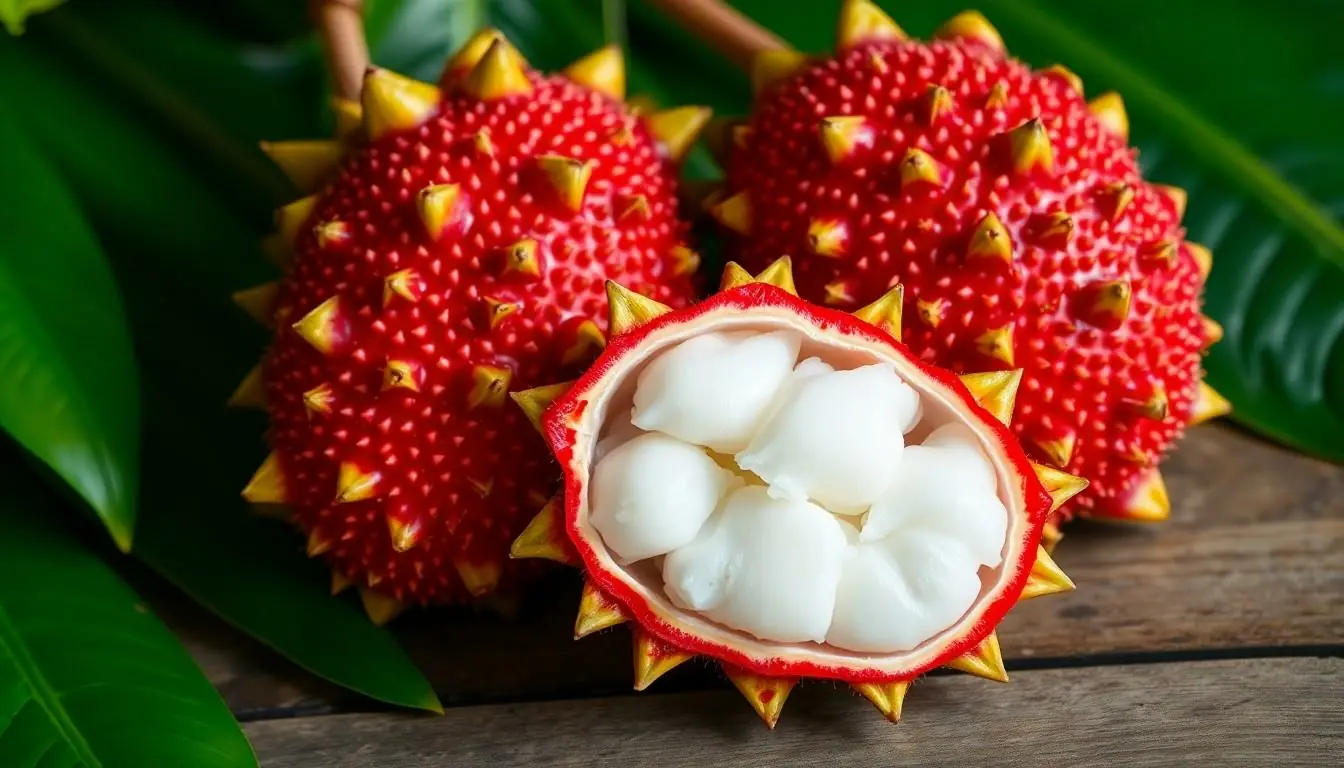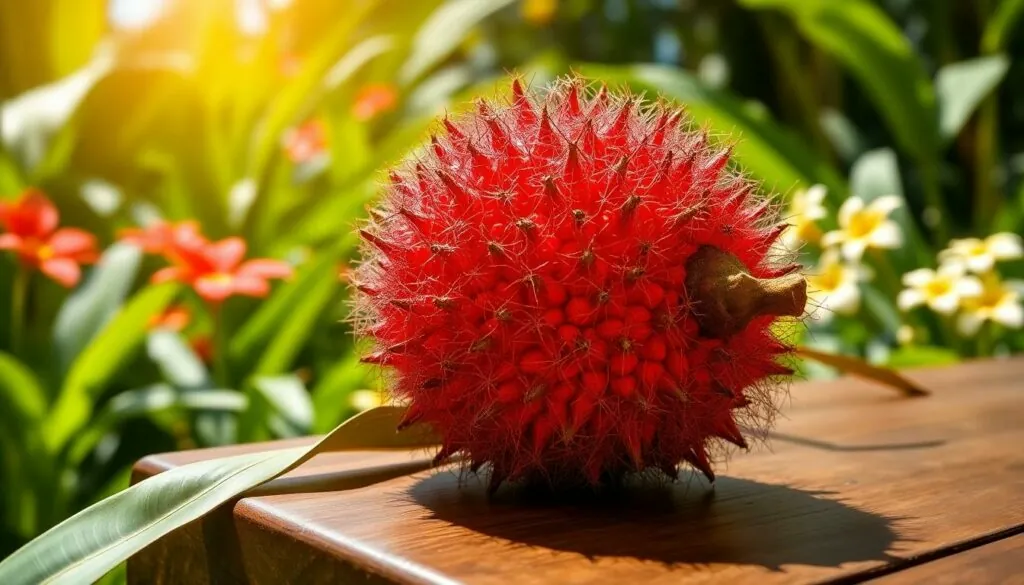Table of Contents
ToggleRambutan might look like a quirky creature from another planet, but this tropical fruit packs a punch when it comes to nutrition. With its hairy exterior and juicy, sweet flesh, it’s not just a pretty face. This exotic delight is a treasure trove of vitamins and minerals, making it a must-try for health enthusiasts and adventurous eaters alike.
Overview of Rambutan Nutrition
Rambutan contains numerous essential nutrients that contribute to overall health. It provides a good source of vitamin C, known for boosting the immune system. One cup of rambutan offers around 22 milligrams of vitamin C, which represents about 25% of the daily recommended intake for adults.
Carbohydrates present in rambutan provide energy, mainly consisting of sugars like glucose and fructose. Each fruit contains approximately 23 grams of carbohydrates per cup. Fiber content also plays a significant role in digestive health, with each cup containing about 0.8 grams of dietary fiber.
Rambutan supplies a range of minerals, including calcium, iron, and phosphorus. Calcium supports bone health, while iron aids in oxygen transport in the blood. A serving of rambutan includes approximately 0.1 milligrams of iron, contributing to daily mineral needs.
Antioxidants feature prominently in rambutan, helping combat oxidative stress and inflammation. These compounds include flavonoids and tannins, which may provide further health benefits.
A unique aspect of rambutan is its hydration potential, with the fruit consisting of 90% water. Staying hydrated is essential for various bodily functions, and rambutan offers a refreshing way to hydrate.
To summarize, rambutan provides fiber, vitamins, and antioxidants, making it a nutritious addition to a varied diet. Its juicy texture and sweet flavor make it both a tasty and healthful choice.
Nutritional Profile of Rambutan

Rambutan offers a remarkable nutritional profile packed with vitamins, minerals, and antioxidants essential for overall health.
Vitamins and Minerals
Rambutan excels in vitamin C content, supplying about 25% of the daily recommended intake per cup. Calcium and iron also feature prominently, both playing vital roles in bone strength and oxygen transport. This tropical fruit provides a moderate amount of B vitamins, which support energy metabolism. Approximately 0.8 grams of dietary fiber contributes to digestive health, while its low-calorie count makes it an excellent choice for those monitoring their intake. Overall, rambutan supplies a balanced spectrum of nutrients that benefit various bodily functions.
Antioxidants
Rambutan contains several antioxidants, including flavonoids and tannins, known for their health-promoting properties. These antioxidants help reduce oxidative stress, a contributing factor to many chronic diseases. Studies highlight the ability of flavonoids to combat inflammation and support cardiovascular health. Notably, rambutan’s high water content, approximately 90%, aids in hydration, enhancing the efficacy of its antioxidants. Including rambutan in the diet enhances antioxidant intake, promoting overall wellness and vitality.
Health Benefits of Rambutan
Rambutan offers several health benefits due to its rich nutrient profile and high antioxidant content.
Immune System Support
Rambutan provides a significant boost to the immune system. It contains about 25% of the daily recommended intake of vitamin C per cup, a nutrient that plays a crucial role in immune function. Antioxidants in rambutan, like flavonoids, further enhance its protective properties against infections. Eating rambutan can help reduce the duration and severity of respiratory infections. The abundance of vitamin C also aids in collagen production, which supports skin health and enhances defense mechanisms. Regularly including rambutan in the diet strengthens the immune response and promotes overall well-being.
Digestive Health
Fiber content in rambutan contributes positively to digestive health. With roughly 0.8 grams of dietary fiber per cup, the fruit aids in maintaining bowel regularity. This fiber supports the growth of beneficial gut bacteria, promoting a healthy microbiome. Natural sugars found in rambutan provide an easy energy source without contributing to digestive discomfort. Consuming rambutan may alleviate constipation and enhance nutrient absorption. Incorporating rambutan into daily meals can foster better digestive function and overall gut health.
Culinary Uses of Rambutan
Rambutan offers a variety of culinary applications, making it a versatile ingredient in different cuisines. Its sweet, juicy flesh pairs well with dishes like fruit salads and smoothies. Chefs frequently incorporate rambutan into desserts, utilizing its flavor and unique texture to enhance options like sorbets and puddings.
In Southeast Asian cuisine, rambutan often participates in savory dishes. Cooks use it in salsas, bringing a refreshing element to fish and chicken. Its tartness complements sauces and marinades, adding depth to meat preparations.
Rambutan can also serve as a snack on its own. Enjoying it fresh highlights the fruit’s natural sweetness and hydration properties. Sliced into salads, it contributes a delightful crunch alongside greens and other fruits.
In addition to these applications, rambutan’s versatility enables experimentation. Smoothies made with rambutan combine its sweetness with greens or yogurt. Local markets frequently sell it canned or in syrups, providing alternative options for cooking and baking.
Rambutan’s unique flavor allows pairing with both sweet and savory ingredients. Many blend it with other tropical fruits to create refreshing beverage options. Its aesthetic appeal makes it a focal point for platter presentations at gatherings and events.
Overall, the easily adaptable nature of rambutan influences diverse culinary creations. Its ability to balance flavors while offering bright visual appeal strengthens its place in global cuisine.
Rambutan stands out not just for its striking appearance but also for its impressive nutritional benefits. Packed with vitamins and minerals it offers a refreshing way to boost overall health. The fruit’s high vitamin C content enhances immune function while its antioxidants help combat inflammation and oxidative stress.
Incorporating rambutan into daily meals adds not only flavor but also a wealth of nutrients. Its versatility in both sweet and savory dishes makes it an exciting ingredient for culinary exploration. Embracing rambutan can lead to a delicious and health-conscious lifestyle.




